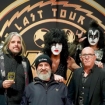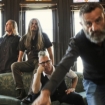Tool appear on the cover of Revolver's Aug/Sept issue, which is available on newsstands now. You can also grab the Tool issue and pre-order a limited-edition box set that includes four alternate covers via our webstore.
"Patience. Trust your process." That's what Maynard James Keenan says when asked what he'd like listeners to get out of the new Tool record. Obviously, the writing and recording of Fear Inoculum was treated similarly, given the nearly decade and a half that's passed since the band's last album. "There's a balance, from a creative standpoint," Keenan says. "You've done the work, the whole practice-makes-perfect. There's a bit of experience that you bring to the table with having done it before. But I think you kind of have to balance that with being in the moment and capturing it."
Of course, Tool's enigmatic frontman has kept plenty busy in the interim. In addition to running his wine businesses (Merkin Vineyards and Caduceus Cellars) in Arizona, he's done an album with A Perfect Circle (2018's Eat the Elephant), embarked upon his outlandish and prolific Puscifer project, and co-authored his 2016 biography, A Perfect Union of Contrary Things. He's also kept up his extensive martial arts practice, which recently expanded from Brazilian jiu-jitsu to include Muay Thai.
But it hasn't all been positive. In June of 2018, an anonymous Twitter user accused Keenan of raping her at an A Perfect Circle show in 2000. Keenan denied the allegation, also via Twitter, calling it a "despicable false claim," and has moved on. He won't answer questions regarding the matter: "I have already said all that I have to say on the issue," he explains in a written statement provided to Revolver.
The incident is just one example of how social media, among many other things, has changed the landscape for Keenan and Tool as they set about releasing Fear Inoculum. In the interview below, the singer discusses the "broad strokes" of the new album's lyrics, as well as his formative years, stage outfits and conflicted relationship with his band's rabid fan base.

WHEN THE LAST TOOL ALBUM CAME OUT, THE PREVAILING FORMS OF SOCIAL MEDIA DIDN'T EXIST OR WEREN'T YET AVAILABLE TO THE PUBLIC. IN THAT SENSE, DO YOU FEEL THAT TOOL IS RE-ENTERING A COMPLETELY CHANGED WORLD WITH THIS RECORD?
MAYNARD JAMES KEENAN I guess so. Even back then, it was really hard for kids — some of my nephews and cousins or whatever — to focus on a movie like Taxi Driver or Apocalypse Now or Deer Hunter ... even, really, The Godfather — those films that took a lot of buildup for character development. There's not a lot of immediate action, like the Transformers series, where things are going bananas in your eyes immediately, but you're not really sure what the story was. In that respect, there's gonna be a lot of people who might not get this album because it does take engagement. If you don't have the patience for that, you're probably not gonna get this album.
WAS IT DESIGNED THAT WAY?
No, it's just what we do. It's always been how we've done it. It's how I've done all my projects. Winemaking is the same thing — it takes time. You can't rush things. There are [wines] you can rush, like a Beaujolais, but that's what it's meant to be. If you want a fine, aged bottle of wine that's been sitting on the shelf for three or four years, that's a process — and you've got to have patience.
HOW HAS SOCIAL MEDIA AFFECTED TOOL — AND YOU PERSONALLY?
I think of the internet in general and all those things as a manifestation of the collective unconscious. That idea, when you first read about the collective unconscious — decades ago — what that would look like. Well, this is kind of a physical or digital manifestation of that concept. All the information is out there and you can tap into it through meditation. But your meditation is focusing a few words in the top bar of the search browser. [Laughs]
HAS IT BEEN DISAPPOINTING THAT THE COLLECTIVE UNCONSCIOUS TENDS TO BE ...
Selfies and Coachella? [Laughs] Yeah, a little bit. But it's like anything else — and I know we've spoken about this before — a hammer is a hammer. You can use it to build something or destroy something, and the internet is no different. It depends on the person swinging the hammer. What is your goal? What do you expect to get from it? Some people don't have any goal. They just wanna swing a hammer. It might accidentally build something or accidentally destroy something.
TO WHAT EXTENT DO YOU HAVE THE LISTENER IN MIND WHEN YOU'RE WORKING ON MUSIC OR WRITING LYRICS?
I don't know that that's a huge percentage of the equation. You have to serve the piece, first and foremost. You have to serve the thing in front of you and work with it — energetically, mathematically, emotionally. It has to fit. It has to go together with itself. You're responding to stimulus in front of you — what you're hearing, what you're feeling. You have to remain true to that. You can't be worrying about what grandma is gonna say about it.

YOU DON'T DISCUSS SPECIFIC LYRICS, BUT WOULD YOU BE ABLE TO SHARE SOME OF THE GENERAL THEMES OF THE NEW RECORD?
I can give you some broad strokes, but I don't want to ruin the experience for you. I feel like that's always an individual's right to process things in the way they wanna process them, and I wouldn't wanna take that from you. But I can give you pieces. And again, it goes back to experience: I feel like this is [about] wisdom through age, through experience. Hopefully through aging you do find wisdom in some of the things you've encountered. Learning from your mistakes, learning from your successes. So if anything is a broad stroke of this album, it would be embracing where we are right now, acknowledging where we've come from and some of the things we've grown through.
WHERE IS TOOL RIGHT NOW? NOT PHYSICALLY, BUT IN THE SENSE YOU'RE TALKING ABOUT ...
Most of us have kids. Some of us have two. So we're at that age where you get to kind of look back and evaluate some of the steps. I feel like we're at an age now that some of the things that used to rub us wrong — whether it's with the band or life in general — we've kind of jumped ahead to remember, "OK, when I reacted this way to this thing when I was 25, it was a waste of energy. So I guess I just won't bother reacting that way." You skip some steps because you've seen the steps. Make sense?
ABSOLUTELY. SPEAKING OF KIDS, YOU WERE THE ONLY MEMBER OF TOOL WHO WAS A FATHER WHEN THE LAST TOOL ALBUM CAME OUT. ADAM AND DANNY HAVE HAD KIDS SINCE THEN — AND YOU'VE HAD ANOTHER ONE. HOW HAS ALL THIS NEW FATHERHOOD AFFECTED TOOL?
Perspective, I think. If you could point to a small missing piece in our history, that would be one of them. Being a father easily 15 years before they were, it put things in perspective for me early. Again, that's a small part. I'm speculating. But it definitely put things in perspective ... with longer-term goals. You gotta have backup plans. Because once you have that kid, it's no longer about you.
I'VE BEEN READING YOUR BOOK. YOU DESCRIBE RELYING ON YOUR HEAD, HEART AND GUT WHEN YOU WERE A KID AND BEING MOVED TO DIFFERENT SCHOOLS. HAVE YOU APPLIED THAT PHILOSOPHY TO TOOL?
In any of those situations, you're gaining a new perspective anytime you roll into a new school or a new setting. And I guess in some loose way, not having been the guy who grew up in one spot with a bunch of brothers — where you maybe fall into the same patterns, maybe you root for the same teams ... I don't know, I didn't have the brothers and sisters — but I think you can approach things from a different perspective because you've already seen it from a different perspective than most people. Each song is a new thing you can look at with fresh eyes. You can look at it from the outside rather than reacting from the inside.
YOU ALSO TALK ABOUT A PASTOR AT YOUR PARENTS' CHURCH WHO TAUGHT YOU IF YOU FOCUS ON THE TELLER OF THE TALE, YOU MISS THE POINT OF THE STORY. HOW DOES THAT APPLY TO TOOL, AND THE ATTENTION FOCUSED ON YOU?
I don't know ... I don't know that I've done it very well. All you can really do is look to parts of your experience but also the experience of others and what you've seen in your friends and how it's either elevated or destroyed them — how they handle it, I guess. That's hard. There's no easy answer to that. Know thyself, right? Sound mind, sound body and all those wonderful things you learned in philosophy and psychology classes. But I think it goes back to what you said earlier about rolling into different schools and getting different perspectives. I almost feel like you can see how attention, as it relates to recognition ... I think somewhere along the line my father and mother didn't just try to teach me. They showed me the difference between attention and recognition. So feed the good wolf, starve the bad one.
HOW DOES THAT IDEA DOVETAIL WITH YOUR STAGE OUTFITS? YOUR DISGUISE TAKES FOCUS OFF MAYNARD THE INDIVIDUAL, BUT IT ALSO ATTRACTS MORE ATTENTION AND BECOMES A TOPIC OF DISCUSSION.
Well, it's a performance — you want them to talk. That's what you're there for, right? You're there to entertain and you're there to inspire, so of course they're gonna talk about the clown. The clown is there for you to talk about. If it inspires you in a good or a bad way, that's not really up to me. But it helps to put on your clown nose and your floppy shoes and go out ... It allows me to let the clown be there, but it allows me, behind the clown, to focus on the music and to make sure we're delivering those emotional landscapes the best we can each night.

YOU USE THE TERM "CLOWN." YOUR CURRENT OUTFIT, AS OF THIS INTERVIEW, HAS A JOKER-ESQUE QUALITY TO IT. IS THAT WHAT YOU'RE GOING FOR?
I guess ... there's some of the absurdity of the early London punk movement. I've always been inspired by that. It's equal parts intense and artistic and rebellious, but also kind of comical. I like that idea of comedy and tragedy colliding. But yeah, I guess there could be a little bit of Joker in there.
CAN YOU DESCRIBE THE THOUGHT PROCESS BEHIND PICKING A STAGE OUTFIT?
You wanna make sure form follows function. There's things I need to be functional at my age. You don't wanna see a chubby 55-year-old running around in his underwear. That's just fuckin' gross. So the blue paint is out. You don't wanna see grandpa in blue paint. That's just — come on, don't do that. Like when you see grandpa at the beach with his marble bag? Nah. So you gotta come up with the clown outfit that finds that balance, that happy medium.
TOOL HAS HAD A RABID FAN BASE FOR DECADES. HOW HAVE YOU DEALT WITH OVERENTHUSIASTIC FANS OVER THE YEARS?
There's an army of people out there who absolutely appreciate what we're doing and I feel like it's part of the multiple dimensions and facets of their world. We're just one thing in their day, and they appreciate it deeply. When you get the people who are a little more fanatical, those are the ones who make you pause and go, "Did I do something wrong?" [Laughs] I don't understand that. But you're always gonna have people who misinterpret and go too far. But for the most part, I feel like we've nurtured a fan base with Tool, with A Perfect Circle, with Puscifer ... who appreciate the process and appreciate the art. And we're extremely grateful.

YOU'VE TALKED ABOUT MARTIAL ARTS AS A MEANS FOR SELF-IMPROVEMENT. DOES THE SAME PHILOSOPHY APPLY TO MUSIC?
Yeah, provided you set yourself up with different challenges. If you're just gonna write the same songs on every album, that's not gonna really help you move forward. Giving yourself challenges and goals to hit — and being honest when you didn't hit them and readjusting and starting over is really important. It's the same with martial arts. I've been doing jiu-jitsu, and I'm not very good at it, but I keep fighting the fight. I've actually shifted gears a little bit to include Muay Thai, and it's like learning to walk and talk all over again. It's a pretty intense mind-fuck to go from jiu-jitsu, which is a lot of pressure and leverage and balance, to the loose nature of strikes and seeing them coming from everywhere. Kicks, strikes, elbows, knees — it keeps you on your feet. [Laughs] Well, unless you get hit.












